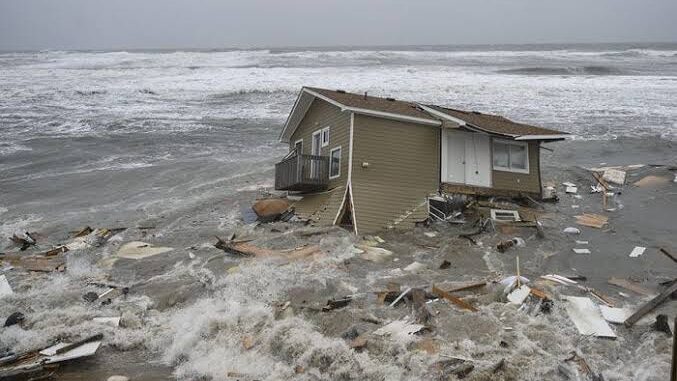
The recent collapse of the “Dolphin’s Point” property in Rodanthe, North Carolina, has brought renewed focus to the growing crisis of coastal erosion and its impact on oceanfront homes in the Outer Banks. This marks the eighth home to fall into the Atlantic Ocean in this area since 2020, highlighting the increasing vulnerability of seaside properties due to natural forces.
The home, located at 23214 Corbina Drive, was a single-story structure that collapsed on August 16, 2024. Its fall was primarily caused by deteriorating pilings, which had been severely weakened by persistent surf erosion and intensified wave activity driven by Hurricane Ernesto. Thankfully, no one was inside at the time, and no injuries occurred. However, the incident led to a dangerous spread of debris along the shoreline. As a result, officials closed the beaches stretching from Rodanthe to the nearby Jug Handle Bridge to protect the public from potential hazards.
Following this collapse, local authorities identified eight more properties in Rodanthe as unsafe for occupancy. These homes, mostly located on Kohler Court and East Ocean Drive, were disconnected from utility services as a precautionary measure due to their precarious positions. A ninth property that was previously considered unsafe had utilities restored after re-evaluation. Officials are also warning residents and visitors of threats posed by debris such as broken concrete, wires, and exposed septic systems that now litter the coastline, making the area unsafe for beachgoers.
In the wake of the destruction, the owners of the Dolphin’s Point property have appealed to local and federal officials, including Congressman Greg Murphy, for assistance. They are seeking to have the National Park Service acquire the property at a reduced valuation. This would allow for an official removal of the remains and prevent further environmental damage. This strategy mirrors a previous effort from 2023, when the National Park Service purchased and removed multiple vulnerable homes on East Beacon Road in Rodanthe.
These recurring incidents point to a broader and escalating problem that demands urgent attention. Experts attribute the collapses to a combination of rising sea levels, stronger storms, and the natural shifting of the barrier islands that make up the Outer Banks. These effects, largely linked to climate change, are making it increasingly difficult to protect properties that were once considered safely distant from the ocean.
To address the crisis, policymakers and environmental experts are considering managed retreat as a long-term solution. This approach involves relocating homes and infrastructure away from high-risk coastal zones to allow natural shoreline processes to continue unimpeded. While this is a controversial topic—particularly for property owners—it is seen by many as a practical response to the growing threat.
Ultimately, the situation in Rodanthe reflects a broader challenge faced by many coastal communities worldwide. As environmental conditions continue to shift, it becomes critical for governments, homeowners, and planners to work together to find sustainable solutions that protect both lives and the environment in an era of rapid change.
Leave a Reply